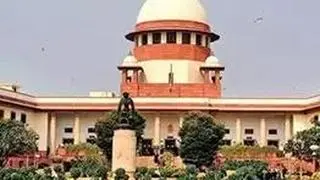Runaway transmission of the Covid-19 virus in Kerala and the seemingly unending upward revision of its death backlog, a process that began last October, have earned the state’s once-storied pandemic defence strategy a resounding disapproval from critics.
But there are some who pat the state for being ‘brutally frank’ with numbers – possibly messed up initially, but being acknowledged now. Experts that BusinessLine spoke to say data transparency is positively correlated with more consistent reporting of deaths and cases.
Unravelling death numbers
Sunday’s daily Covid statistics revealed 26,729 new cases out of 88,098 tested (test positivity rate, TPR of 30.34 per cent, down from a peak of 50 per cent-plus during the third wave). But the state’s bugbear is the still-unravelling deaths and their backlog.
It reported 22 deaths in 24 hours ending Sunday noon; 115 more lives lost during the few days prior were accounted only on Sunday since supporting testimonials were delayed, while 378 others were added based on appeals as per Supreme Court guidelines last year (cumulatively 58,255).
Unabated death revisions prompted the Centre to seek clarification over the state’s reporting mechanism, saying daily reconciliation of large numbers has led to an overall skewed scenario of Covid-19 mortality, impacting planning for public health response.
‘Intentions were suspect’
Some public health experts say that the State’s intentions were suspect from day one, since it was keen to keep the “Kerala model” intact, especially after the success of controlling the Nipah virus.
Dr SS Lal, a former World Health Organization official and Head, Public Health at the Global Institute of Public Health, Thiruvananthapuram, says he had flagged his concern to the State saying the Covid-19 virus was quite unlike ‘the self-limiting’ Nipah virus.
But the administration paid no heed to such public-health warnings from him and others, he alleges. Its priority had shifted from ‘telling the truth’ to papering over inconsistencies in case reporting and incongruity in mortality data streaming in from districts.
Counter argument
Dr Rajeev Jayadevan, Vice-Chairman, Research Cell, IMA-Kerala counters this saying that, to the contrary, current numbers may have been grossly overcounted for a number of reasons.
The crude death rate in Kerala is 6.9 per thousand per year from the pre-pandemic era. This translates to an average of 680 deaths per day for past several years, without the pandemic.
The TPR has been hovering above 40 per cent which means that a large number of people are testing positive without actually having serious disease from Covid-19.
Better reporting tells
“It follows that out of the 680 people who would die supposedly of natural or other causes every day, a substantial number will be ‘Covid positive’ since testing is regularly done at hospitals,” adds Jayadevan.
Asked about the high number of cases and mortality in Kerala, Dr Chandrakant Lahariya, a medical doctor, epidemiologist and health systems specialist, said, “the short answer is, they have better reporting.”
The ICMR’s fourth sero positivity study had showed that Kerala picked one in six cases and Maharashtra, one in 12, compared with one in about 100 in Uttar Pradesh and the country’s average of one in 30.
‘Kerala is no outlier’
The study also observed that half of Kerala’s citizens remained susceptible to Covid-19, ironically due to good containment measures adopted by the state. “In other places where already a good proportion of citizens have got the disease, the susceptible population to new infections is less. This answers why cases are still occurring in Kerala.”
“Kerala is not an outlier,” observes Lahariya, indicating that the compensation being paid to people who died from Covid-19, was being reflected in the numbers and reconciliations.
Some doctors point to legal reports from different States where the number of Covid-19-linked compensation (ex-gratia paid to families where a member’s death was linked to the virus infection) was far greater than the official record of reported deaths. This is not the case in Kerala.
Death compensation mismatch
Jayadevan explains that since every death that occurs within 30 days of a Covid positive clinical diagnosis is to be considered a Covid death as per the SC order, all of these deaths will be classified as Covid deaths.
This in part explains the high reported death rate. It is important to separate genuine Covid related deaths from this number as some states have done, where there is substantial discrepancy between the official Covid deaths and deaths that are eligible for compensation.
“We must have a separate list for death directly occurring from Covid-19 for research and analysis purposes. A person dying from another condition getting classified as a Covid death will lead to wrong conclusions and decisions; for instance about the effectiveness of vaccines and other treatment protocols. Such deaths can also get wrongly classified as vaccine failures.”
Contentious matter, always
Since the SC issued the order in late 2021, the definition of Covid-19 death became easy for classification purpose, but unfortunately became unsuitable for scientific analysis. “For instance, even if an individual committed suicide within 30 days of a Covid positive death test, it is still considered a Covid death by the current definition,” Jayadevan says.
Defining Covid-19 death has always been a contentious matter, because people may die of other causes too, and the majority of these deaths occur in the oldest age groups –where such non-Covid ailments are commonplace, Jayadevan pointed out.
State denies foul play
The State Government denies any foul play and says it has followed guidelines for determining deaths. It says that deaths, irrespective of comorbidities, shall be declared as Covid-19 death—even when tested negative late—if the treating doctor is convinced that the virus is the causative factor.
So there have been situations when deaths reported as Covid-19 by the treating doctor was declassified as non-Covid-19 by the death audit committee. The reverse, too, has happened in other times when a death not included under Covid-19 has been classified as one following the audit.








Comments
Comments have to be in English, and in full sentences. They cannot be abusive or personal. Please abide by our community guidelines for posting your comments.
We have migrated to a new commenting platform. If you are already a registered user of TheHindu Businessline and logged in, you may continue to engage with our articles. If you do not have an account please register and login to post comments. Users can access their older comments by logging into their accounts on Vuukle.